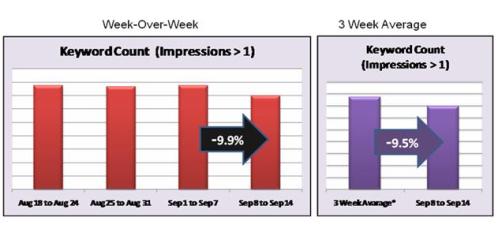GroupM: Google Instant - Will Google's Keyword Tail Become a Fairy Tale? - Michael Verghios - MediaBizBloggers

Google and the other engines often proclaim that they consistently run “experiments” within the search engine results page (SERP). There could be hundreds of these throughout the year. In Google’s case, they usually run on a subset of the user base, collecting data on usage and usability, with the grand plan of helping modify their product to drive continued relevance to the searcher. We’ve seen a gamut of alphas and betas from them - social extensions, Google Suggest, Google Product Search ratings in ads, to name a few.
All media and advertising professionals, companies, organizations and educators are invited to become MediaBizBloggers. For more information, contact Jack Myers at jack@mediadvisorygroup.com. www.MediaBizBloggers.com is revenue-free and accepts only pro-bono advertising for industry organizations and charities, and there is no cost to include your blog.
Their latest experiment, Google Instant, is set forth to save users time searching and increase relevancy. But analysis of early results reveals it may be costing advertisers the long tail.
On September 8 Google changed the experience for users with a feature that delivers a new type of SERP. In essence, the entire page of results refreshes with every keystroke the user enters into the search box.
At Mindshare, we conducted an analysis across our search client base in the United States one week after the launch of Google Instant. Our clients are large advertisers with significant share of voice across brand, generic and tail keywords, and exist across a wide array of verticals. We observed an approximate 10% decrease in the volume of keywords getting impressions after one week.

There was no change, however, to the Google paid search impressions, cost or CTR. If the number of overall impressions remained flat and the number of keywords that drove those impressions decreased by about 10%, it may be an indication that, with Google Instant, we are seeing a trend towards more activity in the general keywords, and less activity in the longer tail keywords.
Instant is no doubt a novel new toy for any end user, but advertisers will be asking what effects Google Instant could have on paid and organic listings, which in some cases is the lifeblood of their business. With search marketing being such an active touch point throughout a consumer’s journey, will this new method of routing intent be favorable for any given brand?
Quite often, Google convinces us not to panic by pointing to the sheer number of active experiments in the market at any one time. The question around Google Instant is, does it fit within the hundreds of other inconsequential experiments, that never make it beyond beta, or is this something that could have a real lasting impact to the searchability and indexability of paid, earned and owned digital assets within the Google landscape.
This early data is indication enough that any savvy advertiser should be looking into specific impacts Instant is having over the coming weeks, including fluctuations to conversion rates and volumes. The impact will vary based on business vertical, keyword mix and spend level. If this is the start of a sustained reduction in Google’s long-tail keywords, advertisers may need to reassess aspects of campaign strategy, including bid management, budget allocation to generic keywords, and negative keyword selection.
All this brings us back to two pivotal values inherent to the success of any search engine - speed and relevancy. Even a casual observer of the Google homepage over the last few years would know that search results are increasingly dynamic, visually rich and user-generated. But how far is too far? Has Google in their quest to bring people almost instantaneous results through an innovation like Google instant, gained speed at the compromise of curtailing true user intent – and therefore post click relevancy? When a user seeking “Volvo” finds themselves clicking on a “Volkswagen” paid ad after typing the first three letters “vol”, does swaying the cognitive mindset of a luxury car shopper bring forth a degraded post-click user experience?
Michael Verghios is Managing Director, Search N.A. at Mindshare. He can be reached at michael.verghios@mindshareworld.com.
Read all Michael's MediaBizBloggers commentaries at Musings from GroupM - MediaBizBloggers.
Check us out on Facebook at MediaBizBloggers.com
Follow our Twitter updates @MediaBizBlogger


